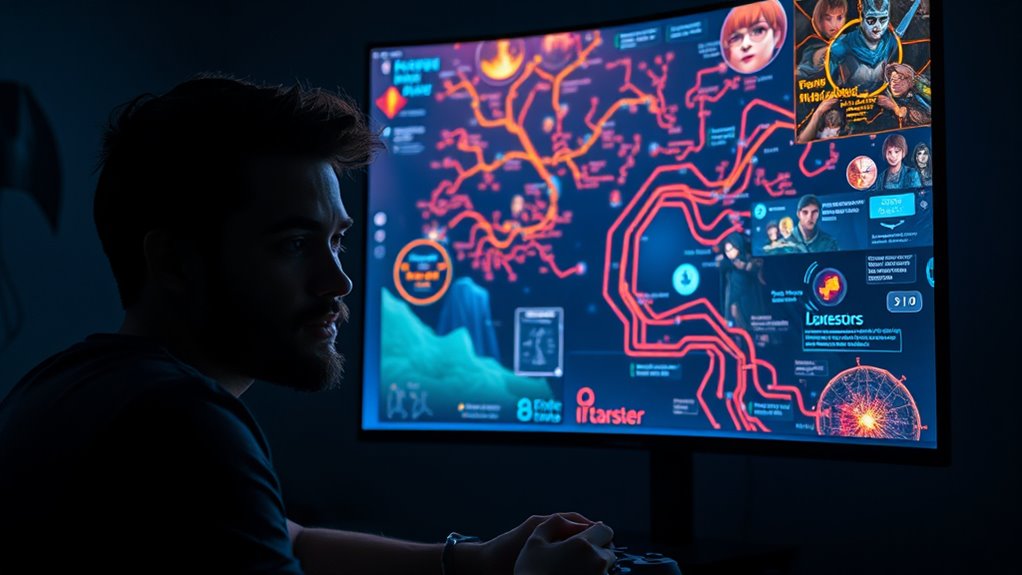AI is revolutionizing how your video game stories are personalized and dynamic. It adapts narratives based on your choices, preferences, and gameplay style, making each experience unique and engaging. AI-driven techniques, like procedural generation and natural language processing, create rich, responsive worlds that react to your actions in real-time. This means no two playthroughs are alike, enhancing immersion and replayability. Explore further to uncover how these technologies are shaping the future of gaming experiences.
Key Takeaways
- AI personalizes game narratives by adapting storylines based on player choices, preferences, and gameplay style.
- Machine learning models predict player decisions, enabling dynamic and responsive storytelling experiences.
- Natural language processing creates realistic, engaging dialogue that evolves with player interactions.
- Procedural generation offers diverse quests and story elements, ensuring unique experiences in each playthrough.
- Adaptive techniques and advanced game engine technology enhance immersion and emotional connection through personalized stories.

Artificial intelligence is transforming how video game stories are told, making narratives more personalized and engaging than ever before. As a player, you now experience stories that adapt to your choices, preferences, and gameplay style, creating a unique experience every time you play. AI-driven dynamic storytelling responds to your actions in real-time, allowing the game to evolve based on your decisions. This means that no two playthroughs are exactly alike, greatly increasing the game’s replayability and immersion. Your interactions influence the narrative direction, making you feel like an active participant rather than just a passive observer.
AI enables the creation of adaptive storylines that shift and grow as you progress. For example, in games like *The Witcher 3* and *Cyberpunk 2077*, the storylines change based on your choices, leading to different endings and character interactions. It’s as if the game recognizes your gameplay style and tailors the experience to suit your preferences. This real-time evolution of the story deepens your emotional connection to the game world, as the narrative feels more personal and meaningful. The technology behind this includes machine learning models that predict your choices, natural language processing that makes dialogues more realistic, and procedural generation tools that create diverse quests and backstories. These tools work together to craft a rich, expansive universe that reacts authentically to your actions. Additionally, incorporating procedural content generation helps to diversify the narrative landscape, providing fresh experiences with each playthrough. Moreover, advancements in game engine technology contribute to smoother and more responsive storytelling, enhancing immersion. The integration of adaptive storytelling techniques further allows games to tailor experiences dynamically based on your gameplay patterns, heightening engagement.
Procedural content generation further enhances personalization by automatically creating a wide variety of story elements, such as quests, characters, and environments. This reduces the manual workload for developers and results in a broader range of narrative experiences. As a player, you benefit from a game that feels less repetitive and more tailored to your interests. Around 65% of modern games now incorporate procedural generation, allowing for endless variations in content. Additionally, about half of current game narratives utilize adaptive storylines, adjusting in real-time to your gameplay choices. This flexibility keeps you engaged, offering new surprises and challenges each time you play. Furthermore, advancements in projector technology contribute to immersive gaming experiences by providing high-quality visuals that complement the personalized storytelling, making the virtual worlds more vivid and lifelike. The integration of home furnishings like comfortable seating and ambient lighting can also create a more inviting environment for extended gaming sessions, boosting overall enjoyment.
Frequently Asked Questions
How Does AI Adapt Stories to Individual Player Choices?
You might wonder how stories change based on your choices. AI tracks your decisions, behaviors, and interactions, then uses that data to shape the narrative in real-time. It creates branching paths, adjusts character relationships, and influences endings, making each playthrough unique. By analyzing your actions, AI guarantees the story responds naturally, giving you a personalized experience that evolves with every decision you make.
Can Ai-Generated Narratives Ensure Emotional Engagement?
You want to know if AI-generated narratives can keep you emotionally engaged. With AI, your game experience becomes deeply personalized, adapting storylines and characters to your reactions and choices in real time. This dynamic approach heightens emotional impact, making you feel more connected to the story. As AI predicts and responds to your emotions, it creates immersive, meaningful experiences that captivate you and make every playthrough uniquely engaging.
What Are the Ethical Considerations of Ai-Driven Storytelling?
You need to take into account bias, cultural sensitivity, ownership, privacy, fairness, and inclusivity when exploring AI-driven storytelling. You must address how biases and stereotypes could be perpetuated, how cultural nuances might be misrepresented, and who owns the content created. You should protect privacy, ensure fair representation, and promote inclusivity. You must also oversee content quality, prevent misuse, and establish ethical standards to responsibly harness AI’s storytelling potential.
How Does AI Handle Diverse Cultural Narratives?
You want to know how AI handles diverse cultural narratives. AI uses machine learning and natural language processing to analyze cultural data, ensuring content is respectful and authentic. It adapts stories dynamically based on regional preferences, creating inclusive experiences. AI also automates content creation, making it easier to incorporate various cultural elements. This approach helps you craft engaging, culturally sensitive narratives that appeal to a global audience while reducing manual effort.
Will AI Replace Human Writers in Game Development?
You might wonder if AI will replace human writers in game development. While AI speeds up content creation and handles large volumes of text, it still struggles with emotional depth, cultural nuances, and complex storytelling. Human writers bring originality and creative oversight, guiding AI tools. So, rather than full replacement, expect a shift toward collaboration, where humans lead creative decisions and AI supports, ensuring authentic and meaningful narratives.
Conclusion
As you journey through these ever-evolving game worlds, you realize that AI’s ability to personalize stories is just the beginning. What surprises await as developers harness this technology even further? Could your choices soon shape entirely unique experiences, blurring the line between player and protagonist? The future of gaming is unfolding right now, and if you think you’ve seen it all, think again. The next chapter is waiting, and it’s more unpredictable than ever.











